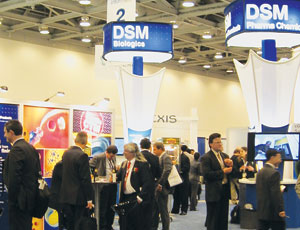Advertisement
Grab your lab coat. Let's get started
Welcome!
Welcome!
Create an account below to get 6 C&EN articles per month, receive newsletters and more - all free.
It seems this is your first time logging in online. Please enter the following information to continue.
As an ACS member you automatically get access to this site. All we need is few more details to create your reading experience.
Not you? Sign in with a different account.
Not you? Sign in with a different account.
ERROR 1
ERROR 1
ERROR 2
ERROR 2
ERROR 2
ERROR 2
ERROR 2
Password and Confirm password must match.
If you have an ACS member number, please enter it here so we can link this account to your membership. (optional)
ERROR 2
ACS values your privacy. By submitting your information, you are gaining access to C&EN and subscribing to our weekly newsletter. We use the information you provide to make your reading experience better, and we will never sell your data to third party members.
Business
Isochem Ups Its Game
With a tighter focus on fine chemicals, the French firm jockeys for a position near the top
by Rick Mullin
March 1, 2004
| A version of this story appeared in
Volume 82, Issue 9

A year after its formation as the fine chemicals operation of France's SNPE, Isochem has cut costs and shifted its diverse operations downstream in hopes of finding a place among the top 10 global fine chemicals firms in the next four years.
Currently the 15th largest firm in the sector, Isochem will have to double its 2003 sales of about $330 million to reach its target, says Bernard Fontana, president of Isochem. Acquisitions, partnerships, and joint ventures--all made possible with state-owned SNPE's conversion to a holding company in 2002--are essential for achieving this kind of growth, he says. The firm is poised to complete its first acquisition, of a traditional fine chemicals business, some time this year.
But Fontana's strategy also places a premium on internal growth through product and process innovation and the expansion of operations in China. Isochem hopes to build its eight-year-old facility in Shanghai to world-scale status through a network of partnerships with local fine chemicals producers, Fontana says. Currently, the plant sells to the local market.
Fontana, who previously held the position of senior vice president for chemicals at SNPE, initiated a cost-cutting regime targeting $15 million in two years. The company eliminated 187 jobs, mostly at its Gennevilliers and Vert-le-Petite facilities in France, and mothballed two multipurpose reactors in Vert-le-Petite, achieving about $13 million in savings in the first year. Fontana has since upped the target to a total of $19 million in incremental savings.
Big changes began at SNPE following the September 2001 explosion at a Total fertilizer plant neighboring Isochem's Toulouse phosgene and fine chemicals facility. Local safety concerns following the blast put an end to phosgene manufacture in Toulouse, which had been a central site for SNPE.
With its worldwide output of phosgene cut by a third to 40,000 metric tons per year, SNPE began directing phosgene derivatives production toward noncommodity markets, primarily pharmaceuticals. This was followed by the decision to shut down its phosgene and derivatives joint venture with Dow Chemical in La Porte, Texas. Isochem currently manufactures phosgene at sites in Lockport, N.Y.; Shanghai; and Kazincbarcika, Hungary.
Officials at SNPE admit the Total accident was a catalyst that pushed the firm to give fine chemicals greater focus under centralized management. With the incorporation of SNPE North America into Isochem in January of this year, Fontana says the new organization is in place and ready to grow. "Our customers now recognize a less complex organization," he says, "yet they have had no change in their contacts."
Fontana sees innovation as the most important engine for growth. "We want to offer the customer not only development services, but also new avenues for new molecules," he says.
The use of peptides in drug development offers an important entrée. Last year, Isochem merged its two peptide operations, Multiple Peptide Systems in San Diego and NeoSystem in Strasbourg, France, forming NeoMPS. It also inaugurated a $7.5 million peptide facility in San Diego. "We want to connect peptides and fine chemicals in order to get better access to people developing new molecules that will later be purchased by the pharmaceutical companies," Fontana says.
Peptide work will also lead Isochem's exploration of biotechnology, a sector in which company officials have said that Isochem would likely need an acquisition in order to develop its business. Fontana says he sees recombinant proteins as a possible growth area.
Isochem will also pursue stronger ties with academic research in areas such as derivatives of amino acids and hydrazine, Fontana says. The company has contracts with the French National Center for Scientific Research in Paris and with universities in Lyon and Toulouse.
In Shanghai, Isochem has invested $6 million over the past two years on plant upgrades and has earmarked another $5 million for 2004 as the plant, which is predominantly geared toward phosgene derivatives, moves into fine chemicals. Fontana says the company will transfer technology from Toulouse to Shanghai, but overall he sees China as a proving ground for sophisticated chemical production and improved distillation processes.
Isochem is targeting growth in a market where growth is still hard to come by. Fontana expects revenues for 2004 to be flat compared with 2003. One bright spot is a multiyear contract landed with Bayer last year to manufacture oxadiazon, a rice and lawn herbicide. To support this work, Isochem is investing $35 million in a plant in Pont-de-Claix that will open in April.
Much of the work done at Isochem over the past year can be viewed in the context of bringing diverse pieces of a sprawling state-owned company, traditionally centered on commodity production, together into a single organization focused on fine chemicals.
A more external focus will follow, according to Fontana, with an emphasis on partnership. "Our industry is about to consolidate, and the market will not allow us to double our size through organic growth," he says. "So why not look for joint ventures with companies that share our philosophy? Why not make something together that creates value and accelerates our growth?"





Join the conversation
Contact the reporter
Submit a Letter to the Editor for publication
Engage with us on Twitter